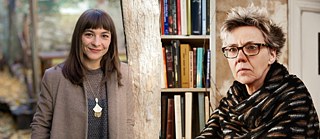The Chamisso Prize 2016 main award has been granted twice: to lyric poet Uljana Wolf and to prose author Esther Kinsky.
Time was when they were barely mentioned, even in small print, today they are increasingly taking their place in the spotlight: the translators who enable us to access foreign-language literature in the first place. When in addition they also emerge as authors, texts of high quality can arise. After all, translators have always been concerned with the formative processes of language as material. Prose author Esther Kinsky translates from Polish, English and Russian, lyric poet Uljana Wolf from English. For their most recent works, Kinsky’s Am Fluß (i.e. along the river, Matthes & Seitz) and Wolf’s I mean I dislike that fate that I was made to where, Wonder Press, November 2015 (Meine schönste Lengevitch, kookbooks) the Chamisso Prize 2016 has been divided equally between the two authors.
The award, sponsored by the Robert Bosch Foundation, will be given on 3 March 2016 in Munich. It is offered to authors whose work is characterised by cultural transition.
Language as Material
Wolf lives in the USA and teaches German as a foreign language in New York, Kinsky lived in England and Hungary for many years. In addition to her novels and volumes of poetry, Esther Kinsky has also reflected theoretically on her work. In her book
Fremdsprechen – Gedanken zum Übersetzen (i.e. speaking in foreign tongues – reflections on translation, 2013, Matthes & Seitz, Berlin), she states unequivocally: “Translation is the art of (…) giving shape to the experience of the foreign on the level of language.” And she continues: “The author clothes an idea, an action, an image in language (…), whereas the translator is only – in the sense of exclusively - concerned with language as material (…) These two aspects – the voice as servant and one’s own art – do not mix, and their mention in the same breath merely illustrates the uncertainty in defining the status of the translator. Competent craftsman or artist? Servant or master?”
Reflective prose miniatures
Bearing in mind the fact that many times a great author has often also been a translator, the equal status of authorial writing and translation really ought to be obvious. In any event, this is how the courageous jury saw it. Following her novels
Sommerfrische (i.e. summer resort) and
Banatsko,
Am Fluß also lives up to this standard. In ever-changing phraseology, Kinsky tells of river landscapes: the Thames, Rhine, Oder, Theiss, Neretva, Hoogly River and the St Lawrence River. In reflective, autobiographically coloured prose miniatures, Kinsky guides the reader from the river of her childhood, the Rhine, into a wide diversity of river landscapes, to return ever again to the River Lea, a small tributary of the Thames to the east of her home in London, which she quasi maps out in literary form.
Free of mystical ballast
For Uljana Wolf, linguistic experimentation and linguistic scepticism are core concepts: is there such a thing as an adequate language for things in the first place? Her highly concentrated poems place each word on the gold scale and perceive much as being too facile. This occurs completely free of mystical ballast, quite the contrary, Wolf evolves a humour impelled by associations that is aroused by the literal sense itself: “Dem Wildwechsel oder Lautwechsel liegen Gründe zugrunde” (i.e. reasons underlie both wild animal crossings and sound shifts). This extends from dadaistic- onomatopoetic smatterings: “kalt ist small, alt ist all” (i.e. cold is small, old is all) to linguistic allusions: “Lautkette, schwappt über Sinnkette” (i.e. sound chain, spills over meaning). In a total of six cycles, in both free verse as well as strophic poems, the author leaps from one word-island to another, citing and discarding traditional forms, borrowing from fairy tales, invoking fragments of every day life. Uljana Wolf references the German-American poet Kurt M. Stein, who wrote in 1925: “In fact, wir sein ready, was das anconzernt.”
Die schönste Lengevitch (more or less literally: my lovely Denglish) thus the book’s title, reveals itself to be the “gap gardening” of an author happily infatuated with language.
Klaus-Dieter Lehmann, President of the Goethe Institut, is a member of the jury of the Adelbert von Chamisso Prize.
